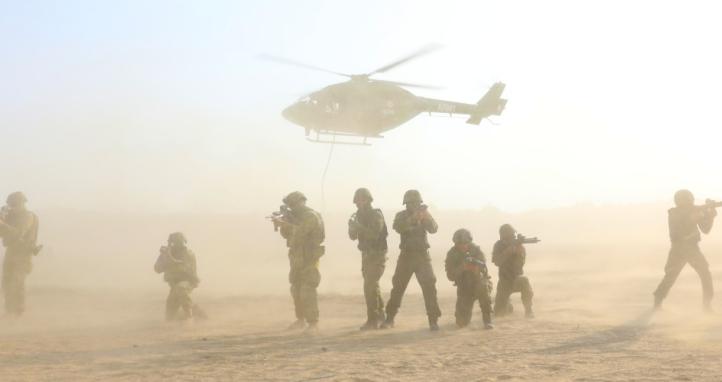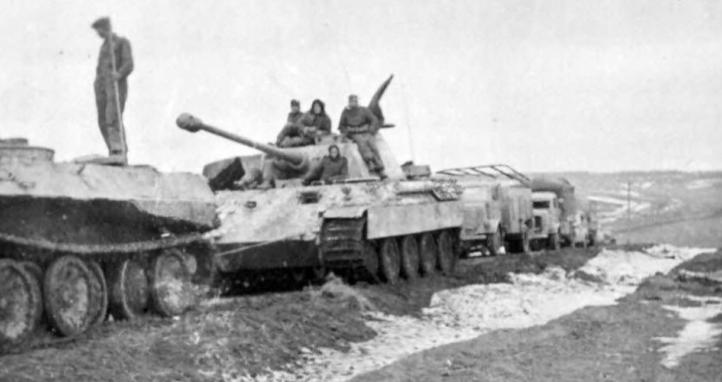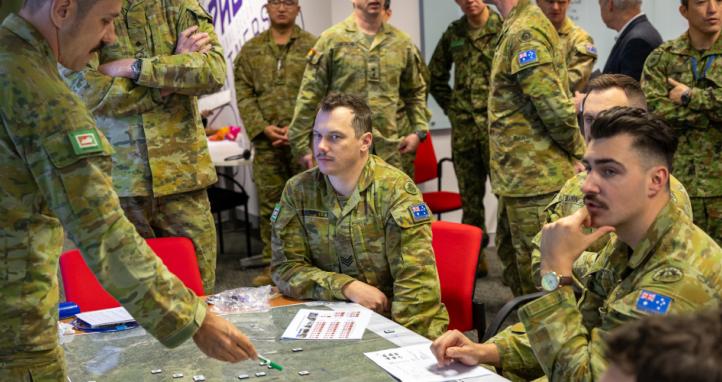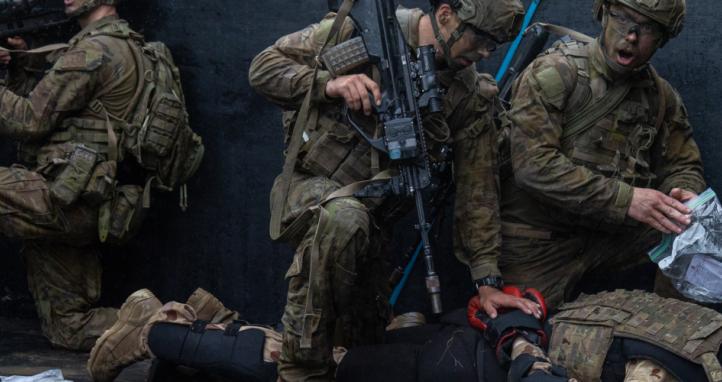A note from The Cove Team: This article is a transcript of an interview with Natalie Sambhi, the Founder and Executive Director of Verve Research. Natalie is a PhD scholar at the ANU Strategic and Defence Studies Centre in Canberra, focusing on Indonesian military history. Find her on Twitter.
For more from Natalie Sambhi, read Indonesian peacekeeping and civil–military relations: a double-edged sword, Finding Partners: Timor-Leste’s Evolving Security Ties with Southeast Asia, Guardian, consumer or middleman? The role of the military in Indonesia’s energy security, and Jokowi’s Maritime Dreams Thwarted by Land-based Challenges.
Samuel Cox (SC): Why is Indonesia significant to Australia and the military?
Natalie Sambhi (NS): The issues that the Australian military cares about are also issues that Indonesia cares about. Working together would actually maximise our ability to be able to solve those problems. Australia can not solve its regional and global issues alone, and it needs a really strong working partnership with the largest state to our north. Indonesia has a much larger military that is used for very different problem sets, and we could learn from those experiences.
SC: You mentioned in that answer that the Indonesia military (the Tentara Nasional Indonesia or TNI) is accustomed to 'different problem sets'. In what areas does it have a comparative advantage to offer Australia?
NS: Well, the Indonesian military knows its own people very well. It has had different historical experiences to the Australian military, and, for better or worse, as a result it actually has a much more direct relationship with its people. When we partner on the issues of Humanitarian Assistance/Disaster Relief or domestic security they have a better understanding of that context.
SC: What do you want junior leaders to understand about the TNI?
NS: Understanding the genesis of any military is incredibly important. The Indonesian military was born out of the National Revolution/War of Independence from the Dutch after the Second World War. Everything it experienced in the years after that involved separatist movements or insurgencies. Therefore, what the TNI cares most about is that the country stays stable, sovereign, and cohesive. There is a concept in TNI, as well as national, thinking: 'Kedaulatan Negara Kesatuan Republik Indonesia setimpal harga kematian'. It means the ‘sovereignty of the Unitary State of the Republic of Indonesia is worth the price of death’ – it is non-negotiable, and a key tenet in the TNI.
SC: Is it possible that attitude might prove a key building block in a closer relationship between our nations? For instance, if we have to become allies out of the necessity to defend our sovereignty from a northern adversary?
NS: There are a number of contingencies that might lead to a closer relationship. Indonesia would not be willing to join a ‘coalition’ though. Traditionally, the political, strategic and foreign policy culture in Indonesia have eschewed alignment, whether ‘alliance’ or anything more than a partnership. We could count on Indonesia as a partner for the right kind of strategic threat, but other than that, it is difficult to imagine us ever having an alliance.
SC: Do you think that Indonesia’s vision for its future is as an independent, stand-alone power?
NS: Absolutely. Since the beginning of Indonesia’s foreign policy culture there has been this idea of ‘swimming between two shores’. Indonesia has always seen itself as an independent actor that wants to be able to sit alongside the larger powers around the world. Traditionally that was in the context of the Cold War, but nowadays Indonesia also sees itself as being able to manoeuvre and get the best out of its relationships with China and the United States, as well as Russia, India and Japan.
SC: Can you explain the TNI’s relationship with civil society? How does this compare today to how it has been historically?
NS: When thinking about the TNI’s relationship with civil society we need to, again, go back to the formation of Indonesia’s military. The TNI was born in the National Revolution and was a drawn straight from the people. Therefore, they don’t just consider themselves the national army, but ‘the people’s army’.
It started as a guerrilla movement which was comprised predominantly of the youth (‘pemuda’) who were trained by Japanese forces occupying Indonesia during World War II to fight back against the Allies and the Dutch. The military also included a small number of Dutch trained officers, many irregulars and volunteers. President Suharto [who was the second President of Indonesia and served for 32 years after the ousting of President Sukarno] was Japanese trained.
The military see themselves as part of society, belonging to the people and working in service of the people. I do note that the military has been used against the people since that time, but that doesn’t stop this idea from having significant resonance within the military. They actively seek to provide medicine, particularly nowadays in response to the COVID-19 pandemic, education and build roads. The TNI have a strong civic services function.
SC: How would you describe Indonesian military culture?
NS: Culturally, much of the way the military sees itself is shaped by ideas from and about their first commander – General Sudirman. He was 29 years old when he was appointed by a military vote, not appointed by civilians, as commander (again the importance of youth). He originally refused the role in favour of his senior, but this was not allowed. After that, already struck with tuberculosis, he led a guerrilla force against the Dutch colonialists while hiding in the jungle. Many cadets go on a pilgrimage that retraces the steps of Sudirman as a tribute and a way to embody what are seen as his qualities of courage, selflessness and humility. It is the loose equivalent of the ‘ANZAC spirit’. Every city in Indonesia has a street named ‘Jalan [Street] Sudirman’ and there’s a massive Jalan Sudirman in Jakarta and a big statue. A mythology has developed around him as a selfless fighter who wouldn’t ‘give up’ and negotiate when the civilians capitulated. This has extended to the TNI itself: ‘they are competent, they know what they are doing, and they will never let the country down’. There is a strand of thinking that the civilians may give in, but the military never, ever will. They are the ‘Guardians of the Nation’, there since the beginning, and empowered by the myth that they delivered independence.
This attitude can have a dark side. From 1965, the military took control of every aspect of governance: from economics, to business development, to agriculture, to social engineering. Everything. In the ideal civil-military paradigm the military is supposed to be a subordinate to civilian control, but the military thought of itself as the rightful ruler.
SC: How important is the military in Indonesian politics? What is their role?
NS: The military doesn’t have a formal role like it used to. In the New Order, it had a certain number of seats in parliament assigned to it, but it no longer has that. However, retired officers have assumed the positions of key ministers, cabinet staff, or key advisors to the President. The military cannot vote, but it has remained important to enjoy the support of the military. Year after year in public opinion polls, the military remains the most trusted institution in the country.
SC: When we think of the Indonesian Defence Force, is it actually tri-service?
NS: There are three services, and marines too. However, as is the case in many militaries around the world, particularly in Southeast Asia, the army is the largest and most important service. They employ a territorial system which means they have a pervasive military presence through the entire country.
This works by having officers and non-commissioned officers at the regional, provincial, district, local, and village level spread throughout the archipelago. We can’t imagine that in Australia. It gives people in Indonesia more frequent and thus normalised contact with the military. The justification is that ‘The People’s Army’ is there to support locals and use its logistics system to deliver rice, aid, etc. The other benefit is that it acts as an ‘early warning system’ or ‘tripwire’ that collects intelligence and identifies unrest, particularly in the more remote provinces.
SC: Historically, there have been many periods of tension in the relationship between Indonesia and Australia. How can we work together?
NS: We need to build strategic trust over time, and that has to be achieved through repeated positive interactions, generational change and constant communication. It’s also important not to expect too much of the relationship. Even then, best efforts can be derailed by political disturbances. Ultimately, Indonesia will expect Australia not to a play a part in the breakaway of any part of its country. That’s its key concern.
The 1995 Australian-Indonesian Security Agreement that was negotiated between then-Prime Minister Paul Keating and then-President Suharto represents the height of closeness in the relationship, before it was torn up in 1999 when East Timor’s referendum happened. Defence cooperation was completely turned off, yet there were a few channels of communication still open. So, consider 1999 as our new starting point – and we must recognise that a lot has happened since then. We’ve rebuilt that defence relationship to the point where we have a calendar filled with Army, Navy and Air Force exercises and training activities as well as civilian dialogues and exchanges. It has all the hallmarks of a robust defence relationship.
Having said that, there are limits to how close the relationship between Indonesia and Australia can get. There’s still a bit of apprehension there, and it’s not the same quality of relationship that we have with the United States.
If you want an ANZUS relationship, it’s impossible and setting the goal so high would be setting oneself up for failure. Again, the idea of an alliance is certainly very remote; though, over time, there may continue to be a trajectory of positive development. Our historical backgrounds, political circumstances, and social makeup are far too different. It seems to me that since 1999 there have been enough recurrent irritations in the relationship to frustrate us getting much closer. The relationship still needs investment and constructive experiences to achieve a common understanding.
SC: How confident can we be that Indonesia will become one of Asia’s great powers? And, if so, how might it use that power?
NS: Size is a quality of its own, and Indonesia has an immense population and a growing economy. While nothing is certain, and the Asian Financial Crisis showed us that much, Indonesia has already rebuilt itself once since the end of the ‘90s. It also depends upon how you define ‘power’. Indonesia has long wanted to play an ‘active’ role in international affairs, but not to establish itself as a hegemon. Indonesia doesn’t have designs to be the great power in the Indo-Pacific, as some other states might, but it certainly wants to play an influential role in shaping the Indo-Pacific environment in a way that is conducive to its own economic growth and stability. Indonesia is also quite serious about keeping certain regional flashpoints stable.
SC: Do you see Indonesia achieving that through its leadership role in the Association of Southeast Asian Nations (ASEAN)?
NS: Indonesia will pursue regional leadership outside of that. ASEAN still achieves what it was set up to do, which is to keep the peace between the ten member states and to promote certain norms between them. By that measure, ASEAN is limited by what it can do in an international sense. So perhaps Indonesia needs to realise its international role through other forums, like the United Nations or the Indian-Ocean Rim Association (IORA). The Indian Ocean is so important to Indonesia (it covers the entire western flank) that it is natural for the country to step up in forums like IORA.
SC: Can you recommend other Indonesia commentators?
NS: Sidney Jones, Noor Huda Ismail, Zachary Abuza and the Institute for Policy Analysis of Conflict team on security and terrorism issues; Evan Laksmana, Greta Nabbs-Keller and Yohanes Sulaiman on strategic and defence issues; Ed Aspinall, Thomas Pepinsky and Aaron Connelly on politics; Gilang Kembara, Ristian Atriandi Supriyanto and Aristyo Rizka Darmawan on maritime security; and IKAHAN for the latest on bilateral exercises and training.










"They employ a territorial system which means they have a pervasive military presence through the entire country.
This works by having officers and non-commissioned officers at the regional, provincial, district, local, and village level spread throughout the archipelago. We can’t imagine that in Australia."
Actually, the Australian Army when instituted on 1 March 1901 had such a system. There were militia depots spread across the nation, and their soldiers were from the local region. This system was strengthened when the compulsory training system designed by then Major J. G. Legge also instituted the practice of posting regular Area Officers to militia/CMF units.